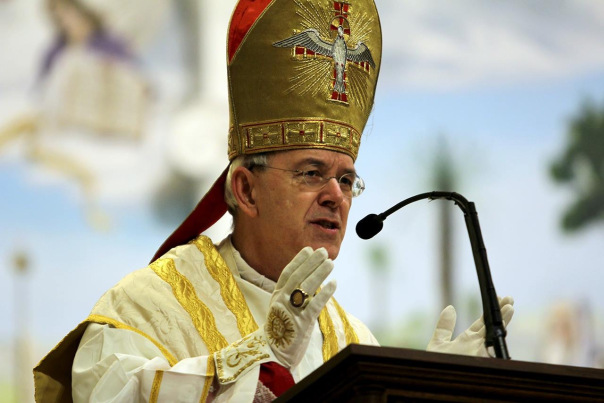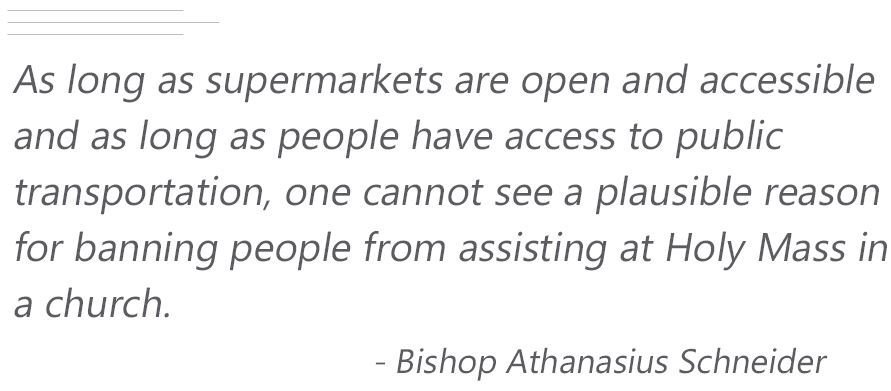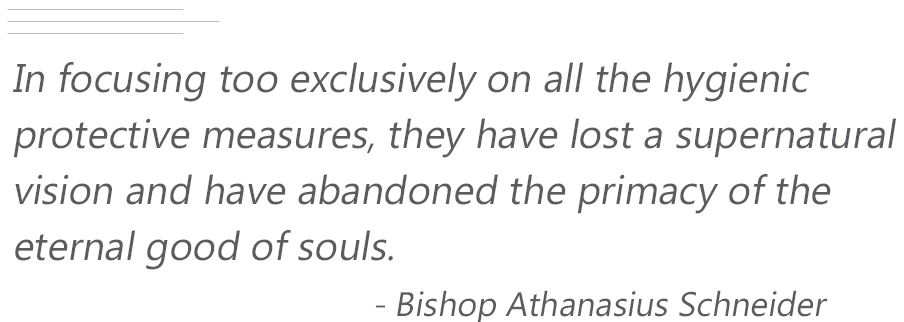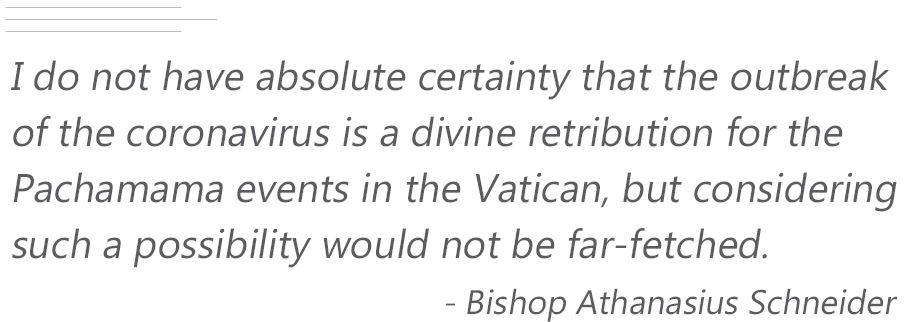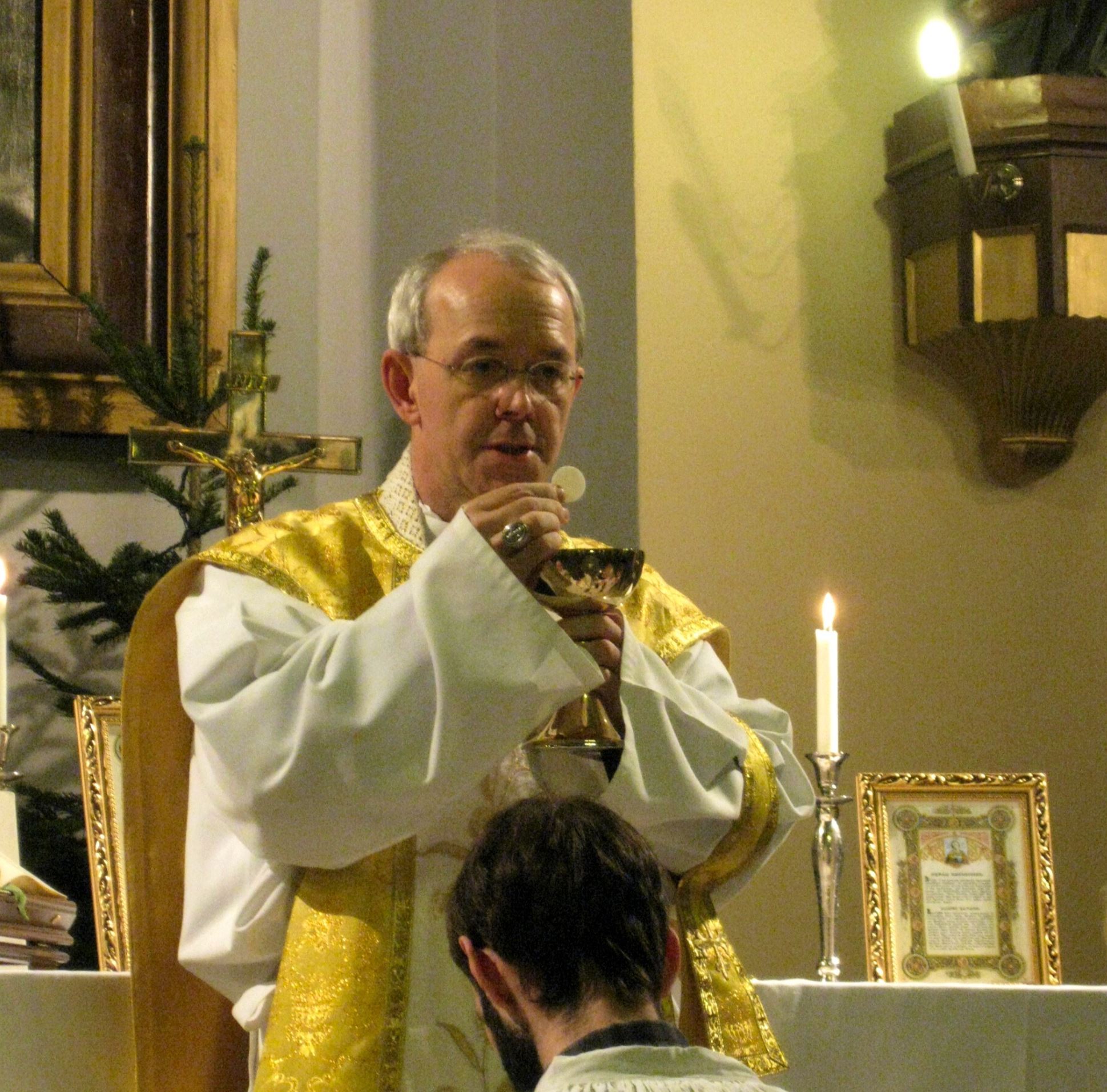“As long as supermarkets are open and accessible, and as long as people have access to public transportation, one cannot see a plausible reason for banning people from assisting at Holy Mass in a church,” Bishop Schneider said. “One can guarantee in churches the same and even better hygienic protective measures.”
He said the Church’s handling of the coronavirus epidemic has revealed a “loss of supernatural vision” particularly among the hierarchy — some of whom, he noted, despite their vigilance to combat COVID-19, have “tranquilly allowed the poison virus of heretical teachings and practices to spread among their flock.”
Bishop Schneider urged priests to remember that they are “first and foremost shepherds of immortal souls,” who are called by their priestly vocation to lay down their lives for the sheep. Amid the coronavirus pandemic, he said priests must “observe all the necessary health precautions” but also “be extremely creative” in finding ways to celebrate Holy Mass and provide the sacraments, even for a small group of the faithful. “Such was the pastoral behavior of all confessor and martyr priests in the time of persecution,” said the bishop, whose early years were spent in the Soviet underground church.
In some cases, he said, the care of souls might necessitate a priest disobeying the unjust order of his bishop. “If a priest is prohibited by an ecclesial authority from going to visit the sick and dying, he cannot obey. Such a prohibition is an abuse of power. Christ did not give a bishop the power to forbid visiting the sick and dying.”
Recalling the heroic example of the sixteenth-century cardinal archbishop of Milan, St. Charles Borromeo (1538-1584), who braved a plague undaunted in order to serve the spiritual needs of its victims, Bishop Schneider said “a true priest will do everything he can to visit a dying person.”
Asked if he believes the coronavirus pandemic is a form of divine retribution for the Pachamama events held inside the Vatican during the October 2019 Amazon Synod, the bishop said that while he does not have “certainty” that these events are related, the idea is “not far-fetched.”
“The cultic veneration of the pagan idol of Pachamama inside the Vatican, with the approval of the Pope, was to be sure a great sin of infidelity to the First Commandment of the Decalogue, it was an abomination,” he said. But he added that “such acts of idolatry were the culmination of a series of other acts of infidelity to the safeguarding of the divine deposit of Faith by many high-ranking members of the Church’s hierarchy in past decades.”
Recalling the Lord’s threat of punishment and call to repentance, directed to bishops in the Book of Revelation (cf. 2:14-16), Bishop Schneider said he is convinced that “Christ would repeat the same words to Pope Francis and to the other bishops” who allowed the veneration of the Pachamama in the Vatican and who “implicitly approved sexual relationships outside a valid marriage” by allowing “divorced and remarried” Catholics who are sexually active to receive Holy Communion.
In the interview on the Church’s response to the coronavirus, Bishop Schneider has also asserted that the uniqueness and severity of the ban on public Masses and sacramental Communion beckons Catholics to consider its “deeper meaning.”
For more than fifty years, he observed, the Eucharistic presence of Jesus Christ has been “trivialized” and even “desecrated” through the practice of Communion in the hand and the introduction of “protestantizing elements” in the Roman liturgy. “Now,” he said, “the Lord has intervened and deprived almost all the faithful of assisting at Holy Mass and sacramentally receiving Holy Communion. The innocent and the guilty are enduring this tribulation together, since in the mystery of the Church all are mutually united as members.”
To make restitution to God, he said the Pope and bishops ought urgently to carry out a public act of reparation in Rome “for sins against the Holy Eucharist” once the coronavirus pandemic is brought under control. He also said the Pope should issue concrete norms inviting the entire Church to “turn toward the Lord” in the liturgy and “forbid the practice of Communion in the hand.”
“The Church,” he said, “cannot continue unpunished to treat the Holy of Holies in the little sacred Host in such a minimalistic and unsafe manner.”
Here is our interview with Bishop Athanasius Schneider
Diane Montagna (DM): Your Excellency, what is your general impression of the way the Church is handling the coronavirus epidemic?
+ Athanasius Schneider: My general impression is that the prevailing majority of bishops reacted precipitously and out of panic in prohibiting all public Masses and — what is even more incomprehensible — in closing churches. Such bishops reacted more like civil bureaucrats than shepherds. In focusing too exclusively on all the hygienic protective measures, they have lost a supernatural vision and have abandoned the primacy of the eternal good of souls.
DM: The diocese of Rome swiftly suspended all public Masses to comply with government directives. Bishops around the world have taken similar action. The Polish Bishops, on the other hand, have called for more Masses to be celebrated so that the congregation is smaller. What is your view on the decision to suspend public Masses to prevent the spread of the coronavirus?
As long as supermarkets are open and accessible and as long as people have access to public transportation, one cannot see a plausible reason for banning people from assisting at Holy Mass in a church. One could guarantee in churches the same and even better hygienic protective measures. For example, before each Mass one could disinfect the pews and doors, and everyone who enters the church could disinfect their hands. Other similar measures could also be taken. One could limit the number of participants and increase the frequency of Mass celebration. We have an inspiring example of a supernatural vision in times of epidemic in Tanzania’s President John Magufuli. President Magufuli, who is a practicing Catholic, said on Sunday, March 22, 2020 (Laetare Sunday), at the Cathedral of St. Paul, in the Tanzanian capital of Dodoma: “I insist to you, my fellow Christians and even Muslims: do not be afraid, do not stop gathering together to glorify God and praise Him. That is why, as a government, we didn’t close down churches or mosques. Instead, they should be always open for the people to seek refuge to God. Churches are places where people can seek true healing, because there the True God resides. Do not to be afraid of praising and seeking God’s face in church.”
Referring to the Eucharist, President Magufuli also spoke these encouraging words: “The coronavirus cannot survive in the Eucharistic body of Christ; it will soon be burnt away. That is exactly why I did not panic while receiving Holy Communion, because I knew that with Jesus in the Eucharist, I am safe. This is the time for building our faith in God.” (President Magufuli’s address can be viewed in Swahili here.)
DM: Do you think it is responsible for a priest to celebrate a private Mass with a few lay faithful present, while taking necessary health precautions?
It is responsible, and also meritorious and would be an authentic pastoral act, provided of course that the priest takes the necessary health precautions.
DM: Priests are in a difficult position in this situation. Some good priests are being criticized for obeying the directives of their bishop to suspend public Masses (while they continue to celebrate a private Mass). Others are looking for creative ways to hear confessions while seeking to safeguard people’s health. What advice would you give to priests on living out their vocation in these times?
Priests must recall that they are first and foremost shepherds of immortal souls. They are to imitate Christ, who said: “The good shepherd lays down his life for his sheep. He who is a hireling and not a shepherd, whose own the sheep are not, sees the wolf coming and leaves the sheep and flees; and the wolf snatches them and scatters them. He flees because he is a hireling and cares nothing for the sheep. I am the good shepherd; I know my own, and my own know me.” (John 10:11-14) If a priest observes in a reasonable manner all the necessary health precautions and uses discretion, he has not to obey the directives of his bishop or the government to suspend Mass for the faithful. Such directives are a pure human law; however, the supreme law in the Church is the salvation of souls. Priests in such a situation have to be extremely creative in order to provide for the faithful, even for a small group, the celebration of Holy Mass and the reception of the sacraments. Such was the pastoral behavior of all confessor and martyr priests in the time of persecution.
DM: Is defiance of authority, particularly ecclesial authority, by priests ever legitimate (e.g. if a priest is told not to go and visit the sick and dying)?
If a priest is prohibited by an ecclesial authority from going to visit the sick and dying, he cannot obey. Such a prohibition is an abuse of power. Christ did not give a bishop the power to forbid visiting the sick and dying. A true priest will do everything he can to visit a dying person. Many priests have done so even when it meant putting their lives in danger, either in the case of a persecution or in the case of an epidemic. We have plenty of examples of such priests in the history of the Church. St. Charles Borromeo, for instance, gave Holy Communion with his own hands on the tongue of dying persons, who were infected with the plague. In our own day, we have the moving and edifying example of priests, especially from the region of Bergamo in northern Italy, who were infected and died because they cared for dying coronavirus patients. A 72-year-old priest with coronavirus died a few days ago in Italy, after giving up the ventilator, which he needed to survive, and allowed it to be given to a younger patient. Not to go and visit the sick and dying is the behavior more of a hireling than a good shepherd.
DM: Your early years were spent in the Soviet underground church. What insight or perspective would you like to share with the lay faithful who are not able to attend Mass, and in some cases, cannot even spend time before the blessed Sacrament because all the churches in their diocese have been closed?
I would encourage the faithful to make frequent acts of spiritual communion. They could read and contemplate the daily Mass readings and the entire order of Mass. They could send their holy Guardian Angel to adore Jesus Christ in the tabernacle on their behalf. They could unite themselves spiritually with all Christians who are in prison for the sake of their faith, with all Christians who are ill and bedridden, with all dying Christians who are deprived of the sacraments. God will fill this time of a temporal deprivation of the Holy Mass and the Blessed Sacrament with many graces.
DM: The Vatican recently announced Easter liturgies will be celebrated without the faithful present. It later specified that it is studying “ways of implementation and participation that respect security measures put in place to prevent the spread of coronavirus.” What is your view on this decision?
Given the strict prohibition of mass gatherings by the Italian governmental authorities, one can understand that the Pope cannot celebrate the liturgies of Holy Week with the attendance of a large number of faithful. I think that the Holy Week liturgies could be celebrated by the Pope with all dignity and without abridgements, for instance in the Sistine Chapel (as was the custom of popes before the Second Vatican Council), with the participation of the clergy (cardinals, priests) and a selected group of faithful, to whom hygienic protective measures are previously applied. One cannot see the logic in prohibiting the lighting of the fire, the blessing of the water and of baptizing at the Easter Vigil, as if these actions would spread a virus. A quasi-pathological fear has overcome common reason and a supernatural vision.
DM: Your Excellency, what is the Church’s handling of the coronavirus epidemic revealing about the state of the Church and particularly of the hierarchy?
It is revealing the loss of supernatural vision. In recent decades, many members of the Church’s hierarchy have been immersed predominantly in secular, inner-worldly and temporal affairs and have thus become blind to supernatural and eternal realities. Their eyes have been filled with the dust of earthly occupations, as St. Gregory the Great once said (see Regula pastoralis II, 7). Their reaction in handling the coronavirus epidemic has revealed that they give more importance to the mortal body than to the immortal soul of men, forgetting the words of our Lord: “For what shall it profit a man, if he gains the whole world, and suffer the loss of his soul?” (Mark 8:36). The same bishops who now try to protect (sometimes with disproportionate measures) the bodies of their faithful from contamination with a material virus, tranquilly allowed the poison virus of heretical teachings and practices to spread among their flock.
DM: Cardinal Vincent Nichols recently said that we will have a new hunger for the Eucharist after the coronavirus epidemic is passed? Do you agree?
I hope that these words will prove to be true among many Catholics. It is a common human experience that the prolonged deprivation of an important reality inflames the hearts of people with a longing for it. This applies, of course, to those who really believe and love the Eucharist. Such an experience also helps one to reflect more deeply upon the meaning and value of the Holy Eucharist. Perhaps those Catholics who were so accustomed to the Holy of Holies that they came to consider it as something ordinary and common will experience a spiritual conversion and understand and treat the Holy Eucharist henceforth as extraordinary and sublime.
DM: On Sunday, March 15, Pope Francis went to pray before the image of the Salus Populo Romani at Santa Maria Maggiore and before the Miraculous Crucifix housed in the church of San Marcelo al Corso. Do you think it is important that bishops and cardinals carry out similar acts of public prayer for an end to the coronavirus?
The example of Pope Francis may encourage many bishops to similar acts of public witness of faith and prayer, and to concrete signs of penance that implore God to end the epidemic. One could recommend that bishops and priests regularly traverse their cities, towns and villages with the Blessed Sacrament in the monstrance, accompanied by a small number of clerics or faithful (one, two or three), depending on the government regulations. Such processions with the Eucharistic Lord will convey to the faithful and to citizens the consolation and joy that they are not alone in time of tribulation, that the Lord is truly with them, that the Church is a mother who has neither forgotten nor abandoned her children. A worldwide chain of monstrances carrying the Eucharistic Lord through the streets of this world could be launched. Such mini-Eucharistic processions, even if carried out only by a bishop or a priest alone, will implore graces of physical and spiritual healing and conversion.
DM: The coronavirus broke out in China not long after the Amazon Synod. Some in the media strongly believe this is divine retribution for the Pachamama events in the Vatican? Others believe it is a divine chastisement for the Vatican-China accord? Do you think either of these positions are valid?
The coronavirus epidemic, in my view, is without doubt a divine intervention to chastise and purify the sinful world and also the Church. We ought not to forget that Our Lord Jesus Christ considered physical catastrophes as divine chastisements. We read, for example: “There were some present at that very time who told him of the Galileans whose blood Pilate had mingled with their sacrifices. And he answered them: ‘Do you think that these Galileans were worse sinners than all Galileans, because they suffered thus? I tell you, No; but unless you repent, you shall all likewise perish. Or those eighteen upon whom the tower in Siloam fell and killed them, do you think that they were worse offenders than all the others who dwelt in Jerusalem? I tell you, No; but unless you repent, you shall all likewise perish.” (Luke 13:1-5)
The cultic veneration of the pagan idol of Pachamama inside the Vatican, with the approval of the Pope, was to be sure a great sin of infidelity to the First Commandment of the Decalogue, it was an abomination. Every attempt of minimize this act of veneration cannot withstand the barrage of obvious evidence and reason. I think that such acts of idolatry were the culmination of a series of other acts of infidelity to the safeguarding of the divine deposit of Faith by many high-ranking members of the Church’s hierarchy in past decades. I do not have absolute certainty that the outbreak of the coronavirus is a divine retribution for the Pachamama events in the Vatican, but considering such a possibility would not be far-fetched. Already in the beginning of the Church, Christ rebuked the bishops (“angels”) of the churches of Pergamum and Thyatira because of their connivance with idolatry and adultery. The figure of “Jezebel,” who seduced the church into idolatry and adultery (see Rev 2:20), might also be understood as a symbol of the world in our day — with whom many charged with responsibility in the Church today are flirting.
The following words of Christ remain valid for our time as well: “Those who commit adultery with her I will throw into great tribulation, unless they repent of her works, and I will strike her children dead. And all the churches will know that I am he who searches mind and heart, and I will give to each of you according to your works.” (Rev 2:22-23) Christ threatened chastisement and called the churches to penance: “I have a few things against you: you have some there who hold the teaching… that they might eat food sacrificed to idols and practice sexual immorality. Therefore repent. If not, I will come to you soon and war against them with the sword of my mouth” (Rev 2:14-16). I am convinced that Christ would repeat the same words to Pope Francis and to the other bishops who allowed the idolatrous veneration of the Pachamama and who implicitly approved sexual relationships outside a valid marriage, by allowing the so-called “divorced and remarried” who are sexually active to receive Holy Communion.
DM: You have pointed to the Gospels and to the Book of Revelation. Does the way God dealt with His Chosen People in the Old Testament give us any insight into the present situation?
The coronavirus epidemic has caused a situation within the Church that, to my knowledge, is unique, i.e. a quasi-worldwide ban of all public Masses. This is partially analogous to the ban of Christian worship in almost the entire Roman Empire in the first three centuries. The current situation is unprecedented, however, because in our case the ban of public worship was issued by Catholic bishops, and even before the relevant governmental mandates.
In some way, the present situation can be also compared to the cessation of the sacrificial worship of the Temple of Jerusalem during the Babylonian Captivity of the Chosen People of God. In the Bible, divine chastisement was considered as a grace, e.g. “Blessed is the man whom God corrects; refuse not therefore the chastising of the Lord: For he wounds, and cures: he strikes, and his hands shall heal.” (Job 5:17-18) and “Those whom I love, I reprove and discipline, so be zealous and repent” (Rev 3:19). The only adequate reaction to tribulation, catastrophes and epidemics and similar situations — which are all instruments in the hand of Divine Providence to awaken people from the sleep of sin and indifference towards God’s commandments and eternal life — is penance and sincere conversion to God. In the following prayer, the prophet Daniel gives to the faithful of all time an example of the true mindset they should have and how they should behave and pray in time of tribulation: “All Israel has transgressed your law and turned aside, refusing to obey your voice. … O my God, incline your ear and hear. Open your eyes and see our desolations, and the city that is called by your name. For we do not present our pleas before you because of our righteousness, but because of your great mercy. O Lord, hear; O Lord, forgive. O Lord, pay attention and act. Delay not, for your own sake, O my God, because your city and your people are called by your name” (Dan 9:11,18-19).
DM: St. Robert Bellarmine wrote: “[S]ure signs concerning the coming of Antichrist ... the greatest and last persecution, and also the public sacrifice (of the Mass) shall completely cease” (The Prophecy of Daniel, Pages 37-38). Do you think what he refers to here is what we are now witnessing? Is it the beginning of the great chastisement prophesied in the book of Revelation?
The current situation provides sufficient reasonable grounds to think that we are at the beginning of an apocalyptic time, which includes divine chastisements. Our Lord referred to the prophecy of Daniel: “When you see the abomination of desolation spoken of by the prophet Daniel, standing in the holy place, let the reader understand” (Mt 24:15). The Book of Revelation says that the Church will have for a while to flee into the wilderness (see Rev 12:14). The almost general cessation of the public Sacrifice of the Mass could be interpreted as a flight in a spiritual wilderness. What is regrettable in our situation is the fact that many members of the Church’s hierarchy do not see the current situation as a tribulation, as a divine chastisement, that is to say, as a “divine visitation” in the biblical sense. These words of the Lord are applicable also to many of the clergy in the midst of the current physical and spiritual epidemic: “You have not known the time of your visitation” (Luke 19:44). The current situation of this “fiery ordeal” (see 1 Peter 4:12) must be taken seriously by the Pope and bishops in order to lead to a deep conversion of the entire Church. If this does not occur, then the message of the following story of Soren Kierkegaard will be applicable to our current situation as well: “A fire broke out backstage in a theatre. The clown came out to warn the public; they thought it was a joke and applauded. He repeated it; the acclaim was even greater. I think that’s just how the world will come to an end: to general applause from wits who believe it’s a joke.”
DM: Your Excellency, what is the deeper meaning behind all of this?
The situation of the public cessation of Holy Mass and sacramental Holy Communion is so unique and serious that one can discover behind all of this a deeper meaning. This event has come almost fifty years after the introduction of Communion in the hand (in 1969) and a radical reform of the rite of Mass (in 1969/1970) with its protestantizing elements (Offertory prayers) and its horizontal and instructional style of celebration (freestyle moments, celebration in a closed circle and towards the people). The praxis of Communion in the hand over the fast fifty years has led to an unintentional and intentional desecration the Eucharistic Body of Christ on an unprecedented scale. For over fifty years, the Body of Christ had been (mostly unintentionally) trampled by the feet of clergy and laity in Catholic churches around the world. The stealing of sacred Hosts has also been increasing at an alarming rate. The praxis of taking Holy Communion directly with one’s own hands and fingers resembles ever more the gesture of taking common food. In not a few Catholics, the practice of receiving Communion in the hand has weakened faith in the Real Presence, in trans-substantiation and in the divine and sublime character of the sacred Host. The Eucharistic presence of Christ has, over time, unconsciously become for these faithful a kind of holy bread or symbol. Now the Lord has intervened and deprived almost all the faithful of assisting at Holy Mass and sacramentally receiving Holy Communion.
The innocent and the guilty are enduring this tribulation together, since in the mystery of the Church all are mutually united as members: “If one member suffers, all suffer together” (1 Cor 12:26). The current cessation of public Holy Mass and Holy Communion could be understood by the Pope and bishops as a divine rebuke for the past fifty years of Eucharistic desecrations and trivializations and, at the same time, as a merciful appeal for an authentic Eucharistic conversion of the entire Church. May the Holy Spirit touch the heart of the Pope and bishops and move them to issue concrete liturgical norms in order that the Eucharistic worship of the entire Church might be purified and oriented again towards the Lord.
One could suggest that the Pope, together with cardinals and bishops, carry out a public act of reparation in Rome for the sins against the Holy Eucharist, and for the sin of the acts of religious veneration to the Pachamama statues. Once the current tribulation has ended, the Pope should issue concrete liturgical norms, in which he invites the entire Church to turn again towards the Lord in the manner of celebration, i.e. celebrant and faithful turned in the same direction during the Eucharistic prayer. The Pope should also forbid the practice of Communion in the hand, for the Church cannot continue unpunished to treat the Holy of Holies in the little sacred Host in such a minimalistic and unsafe manner.
The following prayer of Azariah in the fiery furnace, which every priest says during the Offertory rite of the Mass, might inspire the Pope and bishops to concrete actions of reparation and restoration of the glory of the Eucharistic sacrifice and the Eucharistic Body of the Lord: “With contrite heart and humble spirit let us be received; let our sacrifice be in your presence today and find favour before you; for those who trust in you cannot be put to shame. And now we follow you with our whole heart, we fear you and we seek your face. Do not put us to shame, but deal with us in your kindness and great mercy. Deliver us in accord with your wonders, and bring glory to your name, O Lord” (Dan 3:39-43, Septuagint).
RELATED:


